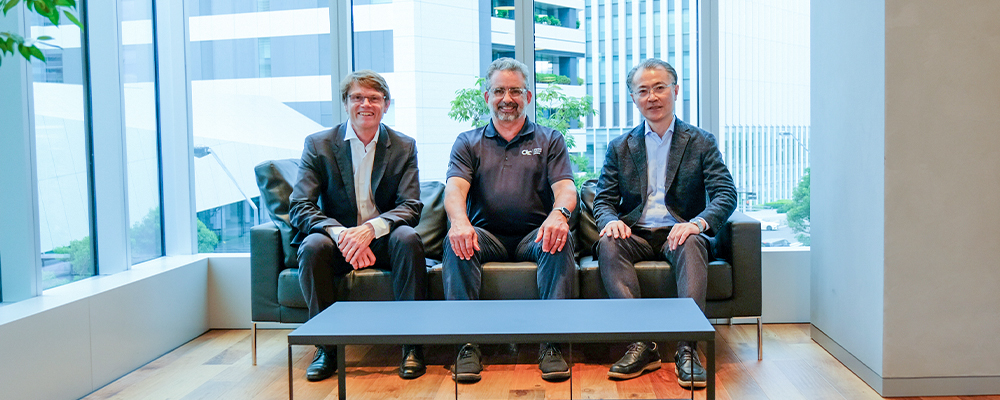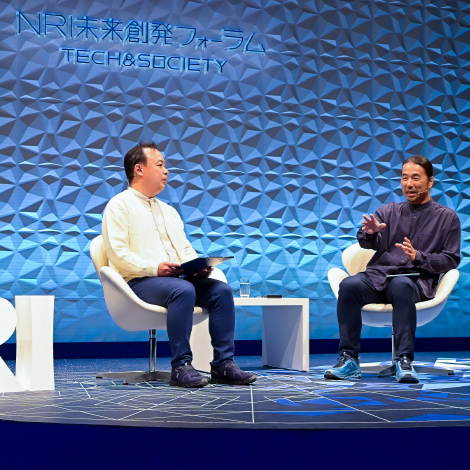Prospects for Logistics Innovations and Next-Generation Human Resources
#DX
#Transportation, Logistics
Sep. 27, 2023
In order to address the “Logistics 2024 Problem” associated with the cap on overtime hours that truck drivers will be allowed to work, the Japanese government announced a “Policy Package for Logistics Innovation” in June 2023, which prescribes guidelines requiring shipping companies to assign logistics officers at the corporate level. NRI’s Tadashi Mizutani believes that human resources development with a focus on driving logistics innovations will become a key issue going forward. He spoke with Professor Benoit Montreuil of Georgia Tech and Professor Eric Ballot of MINES ParisTech, two experts who have been leading the research on a type of logistics innovation that is accelerating globally known as the “Physical Internet”, and asked them about the state of human resource development as it pertains to logistics innovations overseas.
Logistics and SCM Receiving More Emphasis as Management Themes
Mizutani In Japan, there are few universities and graduate schools where students can learn about logistics and supply chain management (SCM), and it’s typical for someone to enter a company and then subsequently gain knowledge through opportunities to get involved in operations related to logistics or SCM. In terms of making the Physical Internet a reality as well, I think developing the brightest minds in the logistics field and in digital technology will be necessary. What are things like in the U.S. and in France?
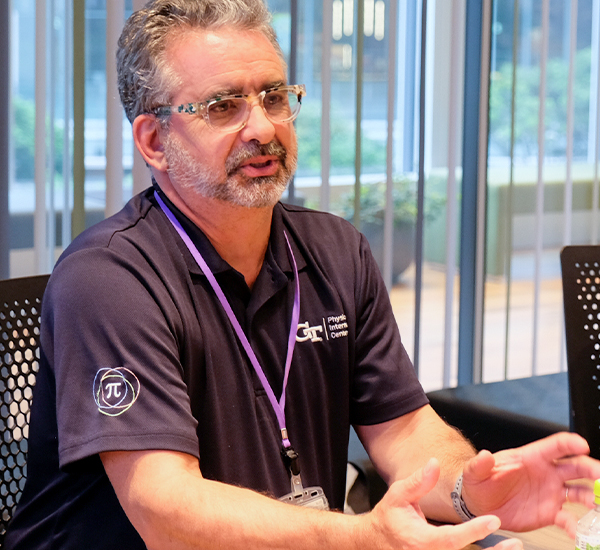
Montreuil The U.S. has a large number of programs that teach SCM. Georgia Tech is a top-class research and education institution for supply chain and logistics studies with hundreds of students majoring in SCM or supply chain engineering. Specialists in these areas have tremendous market value, and our Masters graduates make over $100,000 annually. At the doctoral level, I hear they can even make as much as $180,000 a year. In addition, leading companies in e-commerce, retail, and logistics are active in efforts to train personnel in this field through industry-academia collaborations, and major human resource development projects are being led by NSF (the National Science Foundation) and the Department of Commerce.
Ballot Twenty years ago in Europe, logistics was only one part of the curriculum in business administration, and senior management didn’t show any interest in this field. But now the situation is totally different, and educational curricula dedicated specifically to SCM or logistics can now be found in academia. We’re also seeing companies placing more emphasis on logistics as a management theme, with supply chain officers reporting directly to CEOs, for instance.
Logistics and SCM Have Become More Appealing as Careers
Mizutani What sort of things have led the market value of logistics and SCM specialists to rise, and led logistics to gain greater focus as a management theme?
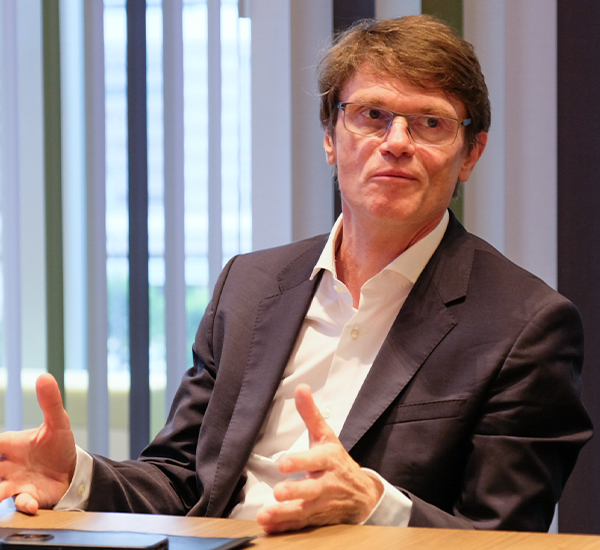
Ballot Logistics used to mean monotonous operations that were conducted locally. But now, operations have become more complicated, as we’ve seen with products being supplied globally and a growing variety of services like one-hour delivery, so operations would come to a halt without exceptional personnel. Additionally, the technology has changed, and the difficulty involved in these jobs has increased, and consequently these areas are becoming more appealing as career choices. For example, Apple CEO Tim Cook’s background is in supply chains.
Mizutani Many logistics officer in Japan gain new skills in the course of their duties. If all of this means the start of something new that’s never existed before, the Physical Internet included, then I suppose that new knowledge will be necessary when it comes to things like optimization and simulations, systems engineering, and so forth.
Montreuil Recognizing that to be a key problem, in the past two years Georgia Tech has been working on developing a new master’s course program that incorporates game-based learning using simulations and such, with a central focus on the Physical Internet and hyperconnected, digital, resilient, and sustainable supply chains and logistics . Experts in this field are in short supply globally, which is why I think that going forward this next-generation human resources development program will end up being expanded on a global scale.
Building a Framework to Develop Human Resources for Logistics Innovations is Also Imperative in Japan
Mizutani I’ve been involved in raising awareness about the global SCM standard “ASCM” as an ASCM instructor. Japanese enterprises have a strong tendency to value making incremental improvements at their individual company sites, and very few companies are interested in mastering SCM from a global perspective. Can you provide any hints about how to change that situation?
Ballot The driving force to bring about change may differ depending on the country or the company. The U.S. is business-driven, whereas the main driving force in Europe is the need to solve social problems like energy transitions, environmental measures, and digitalization. The reason we devised the human resource development program called DIG-SCALE (Digital & Green Supply Chain Academy Learning) at the government’s request was to promote digitalization in the supply chain field. With DIG-SCALE, things like IoT, communications technology, big data, data science, and smart contracts are all part of the curriculum, and our students get hands-on experience through various methodologies like classroom lectures and games while increasing their knowledge and gaining a deeper understanding of what’s effective in a practical sense. We also provide this content to professional organizations that conduct their own training, and we’re deploying this on a large scale.
When you’re pursuing transformation, cultural differences also have an impact. France is a country based on centralized authority, and so the people follow the government’s guidance, but the U.S. is highly market-oriented. In the case of Japan, maybe the government will have to play an important role here.
Montreuil I think that the kind of approach taken in France definitely wouldn’t work very well in North America. You need to think about what would work here , taking into account the current conditions in Japan and its industry. Personally, I see Japan working to adapt successfully , shaping its own roadmap inspired by both Europe’s centralized approach and America’s diversified approach. If the Japanese understand that they themselves need to change, then they’ll find a good solution. Still, to respond to present conditions with a sense of speed, not only will Japan need to have next-generation human resources, but it’ll also need to upgrade its human resources more broadly including the current working-age generation. What’s needed is to formulate a strategic vision that covers not just senior management, but multiple levels of personnel.
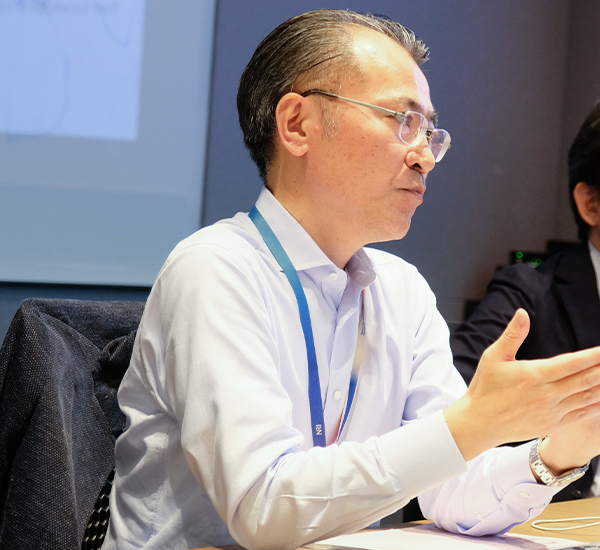
Mizutani In Japan going forward, under the Policy Package for Logistics Innovation, logistics officers at shipping companies will likely come to be responsible for making various decisions related to logistics and SCM. On multiple levels within shipping companies, including the staff supporting the executives, it will be important to continue developing human resources in a cross-cutting way tying together the logistics and digital technology fields. The next-generation human resources development programs being pursued in the U.S. and France for pushing digitalization in the logistics and SCM fields might even serve as a point of reference for efforts to drive logistics innovation in Japan. My hope is that we’ll see a fruitful partnership among industry, academia, and government in Japan that captures the essence of those programs, driving human resources development in a synergy of the logistics and digital technology fields. Professors Montreuil and Ballot, thank you for speaking with me today.



